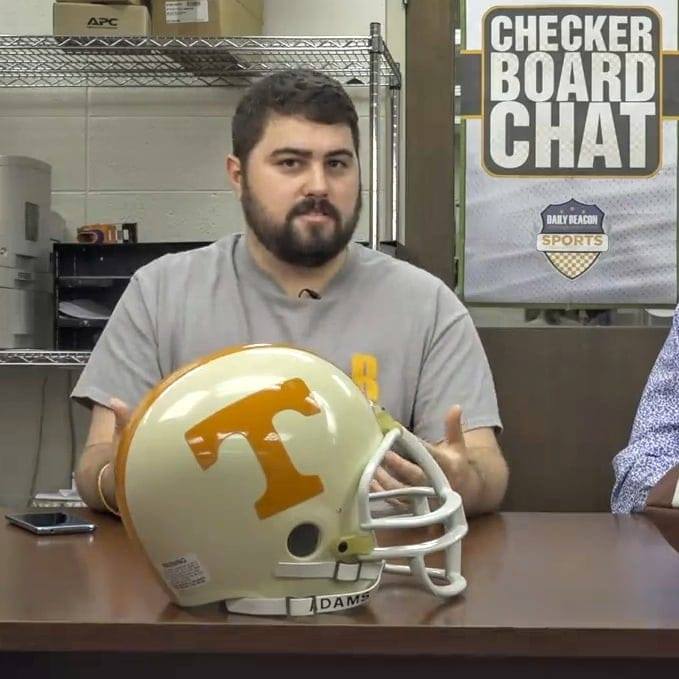Josh Heupel is the latest to join the fray in Tennessee's fight against the NCAA.
The Tennessee head football coach, who is entering his fourth season leading the program, wrote a declaration that was included in a brief filed by Tennessee Attorney General Jonathan Skrmetti Friday as the states of Tennessee and Virginia continue their lawsuit against the NCAA concerning name, image and likeness ahead of a preliminary injunction in federal court next week.
It was obtained by VolReport through a request to the attorney general's office.
TALK ABOUT IT IN THE ROCKY TOP FORUM.
ENJOY VOLREPORT WITH A PREMIUM SUBSCRIPTION.
It is Heupel's first recorded response since the state of Tennessee filed its suit against the NCAA in the wake of the organization's investigation into multiple athletic programs at the school, including football.
The state argued that the NCAA was in violation of antitrust laws in its sudden enforcement of NIL rules. The state of Tennessee was denied a temporary restraining order from the NCAA by a federal judge earlier this week.
Though Judge Clifton L. Corker ruled that the state's filing did not meet the requirements needed for the temporary restraining order, he did write in his report that based on the evidence presented to the Court, the "plaintiffs are likely to succeed on the merits of their claim under the Sherman Act."
The NCAA's current investigation into Tennessee is centered around former five-star prospect in the 2023 signing class and current quarterback Nico Iamaleava and his relationship with one of Tennessee's unofficial NIL collectives before he signed with the team in December 2023.
In Heupel's seven-page declaration, he called the current state of NIL "complicated" and that the NCAA's rules are "vague" and "confusing" because of frequent change. He wrote that because of changing rules, they sometimes "conflict with the NCAA's prior guidance."
Heupel argued that limited or no communication between prospective players and collectives do not give the player the full scope of potential opportunities, which could in turn effect their decision on which school to attend for the worse.
"Harms like these are impossible to fix after the fact. You only get one playing career and you cannot go back in time. These harms can drastically alter the course of an athlete’s college education and their professional career (whether as a professional athlete or in another industry),” Heupel wrote. “Many of these players don’t go on so these four to five years are all they get. We need to put them in position to make the right choice and make the most of their opportunities."
Heupel wrote that financial decisions loom larger for certain players because there is no guarantee of getting to the NFL and that making informed NIL decisions before signing with a school would help set up financial stability.
“Only a small minority of student athletes go on to play pro. Because of the risk of injuries in college sports, an early NIL deal could be the best or only NIL deal they might ever secure," he wrote.
Tennessee is already undergoing recruiting restrictions stemming from its previous run-in with the NCAA for violations committed by ex-head coach Jeremy Pruitt's during a three-year period in 2018-20.
Pruitt was fired for cause in January 2021 and Heupel was hired by Tennessee later that month. His tenure has been marked by navigating through an investigation and the punishments stemming from it, which included scholarship reductions and recruiting restrictions that are still in place.
"During my coaching stops at several different colleges, I've coached at (1) a school that were subject to NCAA discipline and penalties, (2) schools where the NCAA had announced an ongoing investigation and (3) schools where rumors of an NCAA investigation were reported by the press. All of these issues were inherited from prior staffs and none of these were due to my personal actions or actions of those on staff with me. From that experience, I say with full confidence that each situation causes major harms to players, teams and the relevant colleges," he wrote.
Heupel continued to argue the effects that the cloud of an NCAA investigation can have on a program long term, citing the difficulty it creates in recruiting and retaining players.
"Because of NCAA enforcement (or even the threat of it), recruits can end up choosing a different school than the one they might have otherwise chosen. This can mean athletes attending a university that wouldn't have been the best fit for them. This kind of mismatch not only harms the affected player, it also can harm the team they leave behind, as well as the school, the community and the state," he wrote.
The preliminary injunction hearing between the state of Tennessee and the NCAA is set for Tuesday, Feb. 13 at the federal courthouse in Greeneville.
–––––
– TALK ABOUT IT IN THE ROCKY TOP FORUM.
– ENJOY VOLREPORT WITH A PREMIUM SUBSCRIPTION.
– SUBSCRIBE TO THE VOLREPORT YOUTUBE CHANNEL.
– FOLLOW VOLREPORT ON TWITTER: @TennesseeRivals, @TMansfieldMedia, @ByNoahTaylor, @RealTBannerman, @RyanTSylvia, @Dale_Dowden, @ShayneP_Media, @TylerIvens.
–––––
- QB
- SLOT
- OT
- TE
- ATH
- S
- LB
- EDGE
- WR
- EDGE
